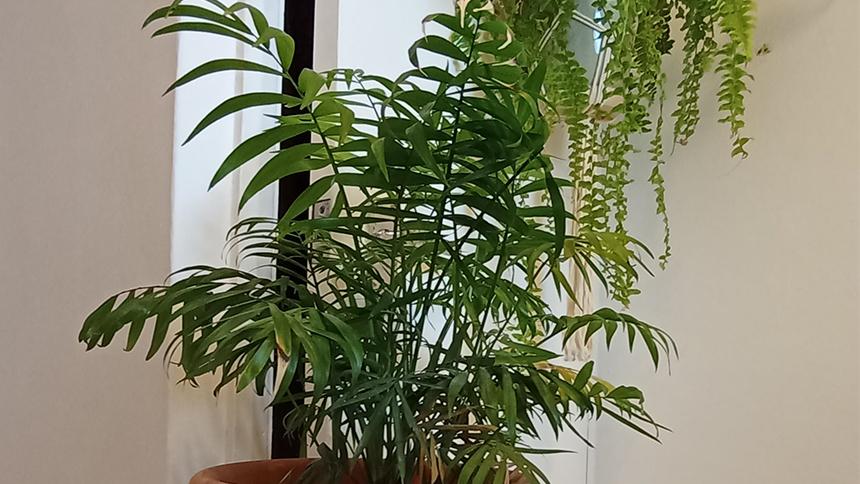Ideas to help a person who has dementia with keeping houseplants
Ways people affected by dementia can still benefit from plants.
For a person with dementia, seeing indoor plants change through the seasons can be a useful reminder of the time of year. How plants look and smell may be calming and pleasurable, and some help to purify the air.
Looking after a plant could help with feelings of self-confidence, and may be especially meaningful for someone who misses being able to garden.
Types of plant
It can help to select plants that don’t need a lot of maintenance – ones that will cope if neglected and won’t shed leaves often.
Check the plants aren’t toxic for people to touch or eat (and for pets if relevant), and avoid plants with thorns, prickles or sharp edges.

Parlour palm.
Examples that are non-toxic for people and pets, and fairly low maintenance, include spider plant (grows outwards and downwards), parlour palm (taller than wide, patterned leaves), coleus (multicoloured leaves), begonia (colourful flowers), and herbs and salad plants.
Choosing plants
Involve the person as much as possible in choosing plants and the pots, troughs, stands or other containers they’re grown in.
Pots will suit many, though the person may also be interested in a terrarium, which can be sealed to make a closed system, or hydroponics, where plants grow without soil.
Would they prefer a range of colours or just greenery? Large or small leaves?
Think about the spaces the plants will grow in, and how they’ll spread to fill them.
Maintenance
If someone else is responsible for watering a plant, a note beside it could remind the person not to do it themselves, or it could be ticked off each time to avoid overwatering.
For some, artificial plants could provide greenery and colour without any fuss.
What you said
On Talking Point, Louise7 says,
‘Mum loved her garden, flowers and house plants. She is now in a care home and is unable to look after plants herself so I try to “bring the outside in”, particularly during the autumn and winter months.
‘I managed to grow a lovely orchid on her windowsill and it doesn’t need too much looking after, just a little water every 7–10 days, which I do when I visit.’

Louise7’s orchid
Sarasa adds, ‘My mum loved having fresh flowers about, and I still send them to her care home from time to time. I certainly find they cheer me up, and you don’t have to worry about looking after them in the same way as plants.’
Weasell shared a picture of a thriving artificial plant, saying, ‘The perfect plant… £35 from Costco. Give it a good blow with the hairdryer every year! Life in plastic, it’s fantastic!’

